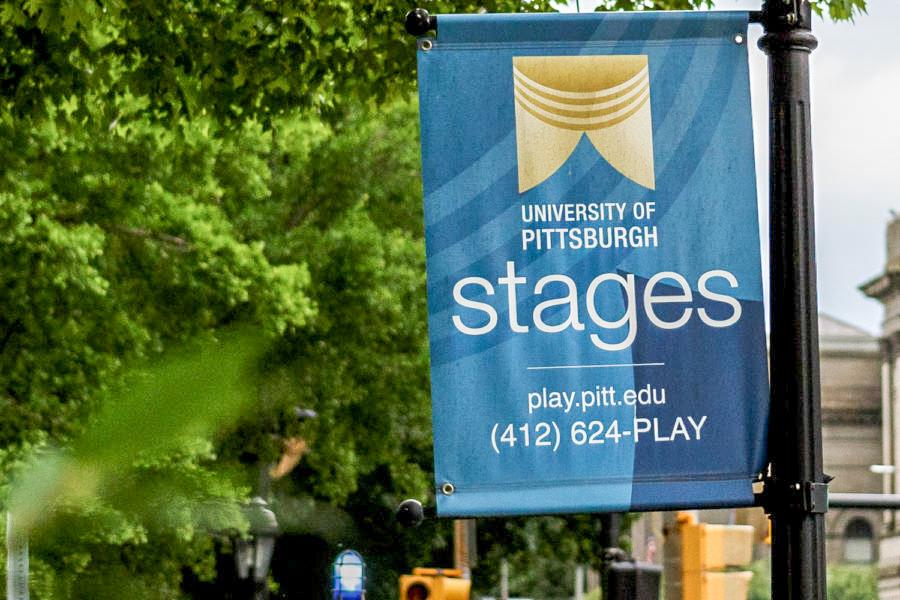Pitt Stages to return with live, in-person theater this fall
For the 2021-2022 season, Pitt Stages is bringing back live, in-person theater this fall.
June 24, 2021
Pitt Stages is bringing back live, in-person theater to Oakland with a fresh slate of productions this fall. With plays touching on a range of topics from African genocide to a young boy’s drag pageant dreams, there are a variety of stories being told.
Pitt’s theater department, through Pitt Stages, puts together these shows for the public and involves students in the making of the production. For the 2021-22 season, Pitt Stages has five mainstage productions, which are large plays performed onstage.
Rebecca Hobart, a rising senior theater major, explained that because last year’s shows were virtual, a lot of thought was put into choosing the slate for this season because of the excitement of being back in person.
“It took a while for the season to be chosen, I think, because we really wanted a good one. It was like going to be the one we came back with,” Hobart said.
There will be two productions this fall — “We Are Proud to Present…” directed by Ricardo Vila-Roger and “The Drag Seed” directed by Hobart. There are three productions lined up for the spring — “Why We Have A Body” directed by Julia Kreutzer, “Emilia” directed by Bria Walker and “A New Brain,” with a director to be announced.
The first production of the season is “We Are Proud to Present a Presentation About the Herero of Namibia, Formerly Known as South West Africa, From the German Sudwestafrika, Between the Years 1884 – 1915,” abbreviated as “We Are Proud to Present…,” by Jackie Sibblies Drury.
Vila-Roger — a lecturer in the theater arts department, who is directing the play — explained that it tells the story of the first genocide of the 20th century from the perspective of a group of actors who are reenacting the extinction of the Herero tribe at the hands of German colonizers.
“It is about a group of six people who are doing a presentation on Germany’s colonization and subsequent genocide of the Herero peoples,” Vila-Roger said. “The play jumps back and forth between the actual presentation to the audience in realm time and the rehearsals where they are putting the presentation together.”
“The Drag Seed” follows the story of a boy named Carson who is determined to get the crown at his school’s drag pageant. Hobart, the director of the production, hopes this show will be a fun way for students to get involved and to present a new story to the audience.
“I know my play is really just a super fun one and is giving students opportunities that they haven’t had before. It’s not like a drama or anything, it’s sort of a spoof kind of play, it’s super camp and super queer, which is so exciting,” Hobart said.
This upcoming season will also have two productions as a part of the reading series. Annmarie Duggan, outgoing chair of theater arts, explains that the reading series will present newly written plays to the audience.
“We will read them so the playwrights can hear them for the first time and our performers can learn to deal with a script that there’s no information about it yet, it’s just what the author put on the page and you’re bringing it to life,” Duggan said.
Kelly Trumbull, a visiting assistant professor in the theater arts department, is directing “Sub-Par,” the reading series’ fall production written by Pitt MFA graduate José Pérez IV. Duggan said this play will be read for the first time, so even the actors do not have prior knowledge of the story.
“The actors will still be able to have the scripts in their hands and just let us know what this new script is like and maybe what’s working and what is not,” Duggan said.
Pitt Stages did not have in-person productions last season and Hobart, who is directing an in-person play this season, was a part of virtual productions. Hobart said she enjoyed making theater virtually because it required her to think differently about how to put the show together.
“It’s been really fun to problem solve and still make theater in really difficult circumstances,” Hobart said.
Although the theater department hopes to be fully in person this season, Hobart said there are things about Zoom theater that she will miss, specifically the amount of reach productions can have when presented virtually.
“Something I love about Zoom theater is how many people can watch it and access it,” Hobart said. “I would love again for us to be able to distribute the project in a wider scope, like we did with Zoom theater. But I’m not sure how those will work out quite yet. I think it’ll take some getting used to.”
Duggan said she sees this fall as a way for the theater department to be able to fully work together once again and reach audiences through the productions in an in-person setting. She hopes the Pitt community will support the theater department’s in-person reopening.
“I think the fall is going to be really exciting. I think that we as a department stuck together through COVID-19 and so we are still a unit, the student faculty and staff,” Duggan said. “I don’t think we could be more excited to be back together in person and tell stories and produce plays.”








